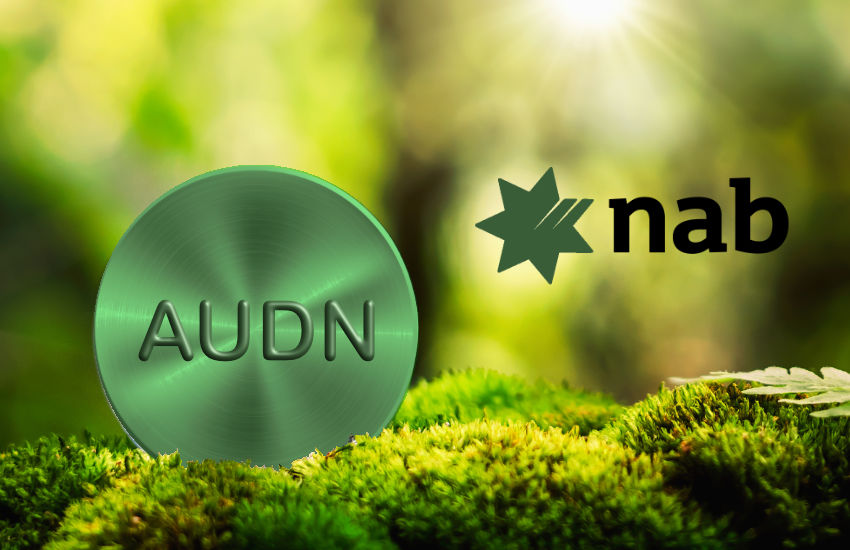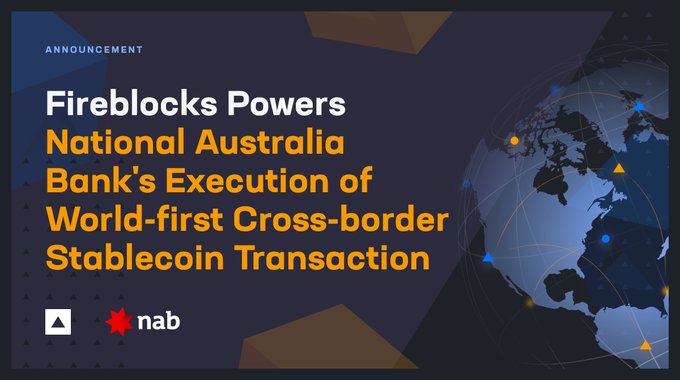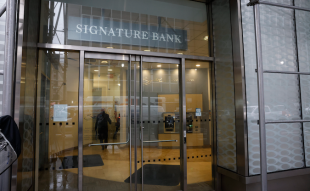Join Our Telegram channel to stay up to date on breaking news coverage
National Australia Bank (NAB) says it has successfully executed the first-ever intra-bank cross-border stablecoin transaction, marking a first for a major financial institution on a Layer 1 public blockchain. The international transfer used a NAB-issued stablecoin (AUDN), which is pegged one-to-one to the Australian dollar.
NAB’s stablecoin, the AUDN, deployed for instant cross-border payments.https://t.co/5gCUFm9ptJ
— Blockchain Australia (@BlockchainAUS) March 13, 2023
According to an official statement made by the bank on March 14, the transaction was conducted on the Ethereum blockchain using smart contracts for seven different currencies. Those currencies were Australian, New Zealand, Singapore and United States dollar, as well as euros, Japanese yen and British pounds, according to a statement released by Fireblocks.
The success of the pilot shows the potential to reduce cross-border transactions from days to minutes and points to a future of instant and cheap cross-border payments compared to the current SWIFT transfer system.
This moves the bank one step closer to providing clients of its many subsidiaries in New Zealand, Singapore, Japan, the United States, Europe and Britain with a simpler and faster experience, starting with corporate and institutional clients.
Excited about the success, Drew Bradford , the NAB executive general manager for markets said the financial institution was investing to develop Australia’s safest, simplest and most secure digital asset ecosystem.
Bradford further said:
We are committed to pursuing the right digital asset opportunities with clear customer benefits. Bringing multi-currency stablecoins to market demonstrates NAB’s focus on simplifying international banking protocols to increase speed and transparency while lowering costs and reducing complexity for customers.
The bank said this week’s transactions proved the bank’s commitment to simply international protocols. It added there are plans to support corporate and institutional clients transacting digital assets before the year ends.
We believe that elements of the future of finance will be blockchain enabled and we’re already witnessing rapid change in the tokenisation market.The stringent governance frameworks we have in place ensures we can support the creation of a safe and reliable digital financial system.
NAB Develops Stablecoin In Partnership With Fireblocks And BlockFold
NAB’s Australian stablecoins AUDN, which will be fully backed 1:1 with the Australian dollar, were minted using the ERC-20 standard and will be managed as a liability of the bank. The Australian bank collaborated with the Fireblocks platform and BlockFold professional services as consultants on the project. This includes leveraging their expertise for smart contract deployment, securely minting and burning the stablecoin and managing the direct custody of the digital assets on the blockchain network.
Michael Shaulov, Fireblocks CEO and Co-founder, commented:
Australia continues to be a global torch bearer for tokenisation in financial services, with NAB leading the charge in the world’s first use case of a large financial institution leveraging a public blockchain for cross-border payment rails. NAB’s successful trade execution marks the beginning of the evolution of financial services from Web2 to Web3, underpinned by blockchain technology as well as strong governance and risk management.”
Francois Schonken NAB’s cross-border multi-currency settlement execution on a public blockchain “ is exhilarating”, marking the first cross-border multi-currency exchange executed using a stablecoin backed “by a regulated large financial institution (NAB)”. Schonken added:
“The NAB eco-system of stablecoins puts in place cross-border payment rails that unlock tokenization potential for both real world assets and financial products”.
Banks To Dominate The Stablecoin Market
NAB is not the first major Australian bank to issue a stablecoin backed by the Australian dollar. According to a January statement, the AUDN coin was created with international transfer and carbon credit trade in mind. NAB was one of the nine founding banks of the international Carbonplace blockchain carbon credit transaction network, which was announced in February.
Its rival Australia and New Zealand (ANZ) Banking Group was the first bank to issue an Australian dollar-linked stablecoin, A$DC, in March 2022. NAB and ANZ have been working closely with Australian financial regulators as laws governing stablecoins are developed.
Reserve Bank governor Philip Lowe said in December that stablecoin regulation must be a priority, and they should be treated like bank deposits. This validates a common belief that Once regulatory certainty is achieved, traditional banking institutions will have the path cleared for them to enter the stablecoin space.
According to a Coidesk report, traditional financial institutions are in an advantageous position considering their existing compliance and legal functions. They may even have support from the banking regulators in pursuing stablecoin development. Additionally, with their retail customer accounts, banks have a built-in category of users for stablecoins.
As the European Union (EU) finalizes the Markets in Crypto-Assets (MiCA) Regulations and works on the digital euro, European banks may start to enter the stablecoin market within the EU. There’s already been significant involvement in blockchain from top players such as BNP Paribas, Deutsche Bank and Societe Generale.
In the United States, finding a path forward on stablecoin regulation, given its direct impact on the traditional financial system, is a policy priority for the Biden Administration and Rep. McHenry, who is now the chair of the House Financial Services Committee. However, the recent crackdown on crypto-friendly banks in what appears to be a well-coordinated government attack on Silicon Valley, Silvergate and Signature banks could slow down things a little bit.
Meanwhile, Australian banks led by NAB will lead the way and stablecoin transactions become mainstream.
Related News:
- How Binance CEO Changpeng Zhao Is Picking Winners And Losers In Stablecoins Like BUSD, TUSD
- Metropoly’s Fraction Investment Model is Taking Over the Market
- Top 5 Eco Friendly Cryptocurrencies to Buy and Hold in 2023
- How to Buy Cryptocurrencies
Join Our Telegram channel to stay up to date on breaking news coverage



